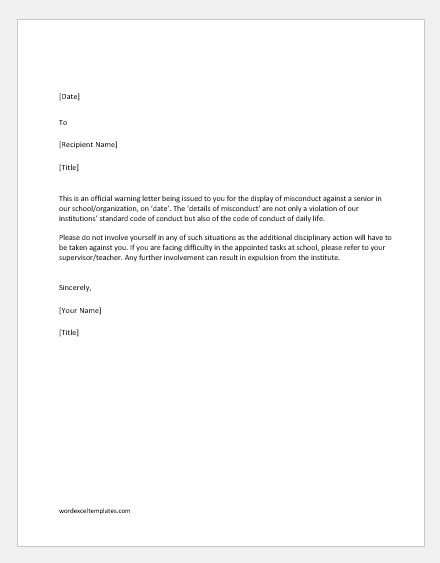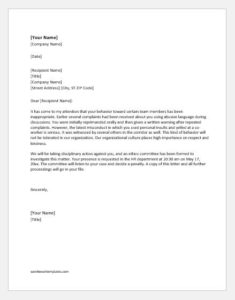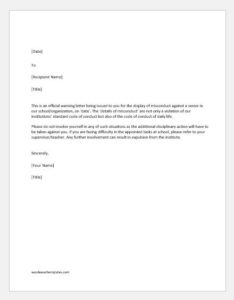What is misconduct at work?
When an employee deliberately disregards the rules and regulations of an organization, he is showing misconduct. The organization has a right to take a disciplinary action against the misconduct of the employee. Anyone who shows misconduct is not considered a professional person. It is completely unethical to not follow the professional standards and code of the conduct while working in an organization.
The misconduct is of two types: gross misconduct and general misconduct.
Minor misconduct:
It is a type of misconduct that does not require any disciplinary action as it does not affect the organization much. The minor misconduct is not very serious, however; the employee is required to avoid it. Showing habitual tardiness at work is an example of minor misconduct.
Gross misconduct:
Gross misconduct is a serious type of misconduct that is likely to ruin the relationship between employee and employer. It is related to the behavior of the employee. The employee will face a serious disciplinary action if he commits gross misconduct. Theft, bullying, abusing other employees are some examples of the gross misconduct.
What is the possible legal definition of misconduct
According to the legal definition, any person gets involved in misconduct when he performs any unlawful activity. These unlawful activities affect the rights of everyone associated with the misconduct and disturb the justice.
Different scenarios/examples of misconduct at work
Some of the common examples of misconduct are:
- Involving yourself in fraudulent activities
- Involving yourself in physical violence
- Causing damage to property
- Breaching the contract with the organization you are working in
- Harassing colleagues
- Not following the safety rules of the state or organization
- Using alcohol or other drugs at the workplace
What is considered as misconduct at work?
Misconduct is never tolerated in the workplace as the employee is expected to work efficiently when he is at work. There are different things that are considered as misconduct at the workplace. Generally, those activities that are likely to damage the reputation of the organization are considered as misconduct. Coming late at work on a daily basis is a type of misconduct. However, it is a minor misconduct. Some other activities are:
- Abusing other co-workers
- Misbehaving with the management of the organization
- Not following the rules of the organization
- Disclosing the confidential information of the organization to a third party
- Using alcohol at the workplace
What constitutes misconduct?
Many people are confused about misconduct. Some people mix not being able to perform some duties with the misconduct. Staying absent from the work due to any genuine problem is not misconduct. The misconduct is the poor behavior of an employee that affects the organization.
Any type of behavior which is more likely to damage the reputation of the company constitutes misconduct and should be avoided so that a professional approach and image can be maintained.
What is considered serious misconduct?
As told earlier, the misconduct can be of different types. The serious misconduct is the one that is not tolerated by the company compels the organization to take some strict disciplinary actions against the employee. In such a situation, an employee can terminate the employer from the job or can take some legal actions against him if the misconduct has seriously caused harm to the organization.
For example, if the employee leaks the confidential information, the organization can send him a legal notice.
What is a disciplinary process?
The disciplinary process takes place when an employee commits misconduct and organization takes disciplinary actions against him. The process may vary from organization to organization. It also depends on the misconduct of the employee.
What are the steps in the disciplinary process?
A disciplinary process includes different steps.
- The employee is sent a letter to inform him about the disciplinary action that the organization is going to take.
- Before sending the letter, the organization ensures that the misconduct has happened due to an employee.
- The employee is asked to give his statement.
- The organization takes a decision in regard to disciplinary action such as termination of an employee.
What is being fired for misconduct?
An employee is fired for misconduct when his behavior is not acceptable by the organization. Usually, the gross misconduct becomes the reason for termination of an employee from the job. The terms and conditions for terminating are specified in the employment contract so the employee knows that how and when he can get fired from the job.
What is a minor misconduct?
Minor misconduct is a less serious type of misconduct. This is not what an employee does deliberately. Anything that does not seriously affect the organization in any way is considered as minor misconduct. When the employee does not submit the assigned work on a given time unintentionally, it is called minor misconduct. There are different ways for organizations to deal with these types of misconduct.
Verbal & written warning for misconduct
The organizations usually issue warning to their employees when they commit any mistake. The purpose of the warning is to make the employee correct his conduct at the workplace. When the misconduct happens for the first time, many employers meet the employee in person and give them a verbal warning. If the employee repeats the same behavior again, the warning letter is issued.
How long is a final written warning valid?
The written warning is valid for one or more weeks. However, the validation duration is decided by the organization issuing the warning. Furthermore, the duration also depends on the misconduct of the employee.
Misconducts at work are not taken very serious generally as long as they are not committed intentionally. The deliberate actions that affect other people working in the organization are however not ignored. Rather, an organization takes serious actions on those bad conducts. The misconduct details should be provided to the employee when he joins the company. He should know which actions of him can be considered as misconduct so that he can avoid them.


